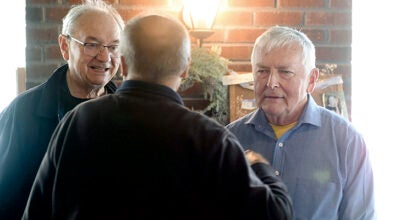PROGRESS 2021: Quest for the Meaning of Life
Published 7:01 am Sunday, February 28, 2021
|
Getting your Trinity Audio player ready...
|
Hormel Institute’s new executive director brings energy to cancer research
From the first moment you meet Dr. Robert Clarke, you realize there is an immediate sense of energy.
The new executive director of The Hormel Institute laughs easily and explains simply and in those moments you realize he’s a perfect fit for his new role.
Clarke came to Austin with his wife Leena Hilakivi-Clarke, Ph.D., in the latter half of last year. Clarke started his job on Aug. 30 following a string of jobs in the profession, including Dean of Research at Georgetown University, where he co-directed the breast cancer research program.
“Just a bunch of things over the years,” Clarke said.
The opportunity to research cancer and try to find ways to combat it came over time, though he wasn’t looking to study breast cancer specifically. Though he lost both parents to cancer, they were unrelated to his role in breast cancer research.
Clarke said he just wanted to do something to be in the fight.
“I wanted to do something that wasn’t rocket science … literally,” Clarke said. “In high school I hated math, and yet I ended up over the last 15 years doing boatloads of math. I thought biology would be good so I went that way and loved it.”
The native-born Irishman had the opportunity to work in a research lab in Belfast and in the process it captured Clarke’s imagination.
“It’s kind of like the quest for the meaning of life,” Clarke explained. “In one way or another we’re all just part of nature. We’re all living organisms and interdependent with one another. That got me very interested in just why that was the case.”
The search for the meaning of life has been a long-held quest by scientists in many different studies. Astrophysicists search the stars for how we came to be, archaeologists examine the ruins of our past in another way to determine the meaning of our life and biologists are searching for those processes that make us who we are.
Like the rest of the scientists at the Institute, Clarke is looking at those things that go wrong in an effort to make things go right.
“It’s captivating because we don’t understand it,” Clarke said. “It doesn’t always behave as we expect it to and we have so much more to learn. It’s one of those times the more you learn the more you realize you know absolutely nothing and there’s so much to learn.”
Complicating things is how little we still know about the human body and when things go wrong, such as exponential and out of control cell growth behind cancer, the situation becomes trickier to unravel.
As we search for how to understand ourselves, the search also includes a conglomeration of attributes that are part of one story.
“There’s a philosophical and almost religious component to it as well, or spiritual component as well as biological functional component and cancer is just a piece of that,” Clarke said. “Where does cancer go wrong? It can go wrong in the brain, it can go wrong anywhere.”
What is evident is Clarke’s love of science and the love of mystery that comes along with it. Mountains and mountains of data can be formulated in any one story and Clarke knows an answer is there somewhere.
It’s got the makings of a great plot.
“I would look at it more like a mystery movie where you think you know what’s coming,” Clarke said. “A-ha! This is who did it and then you get there … NOOO. Sorry, that wasn’t who did it. It’s a wonderful journey as a scientist having a dialogue with nature.”
Clarke said that the search and the mistakes that often follow are still valuable in their own right. One scientist’s mistake can provide answers for another.
“It’s always kind of exciting for scientists because we can pull up a paper that somebody’s just published and read it and say, ‘this is cool as heck,’” Clarke said. “Or we can go into the lab an hour later and get a piece of data and go, ‘what is this … ah, okay. I’ll have to think of something else.’”
While the Institute is used to ground-breaking advancements, Clarke sees the potential for more. Part of that is growing the population of younger scientists and to enhance that growth with more funding of younger answer-seekers.
The Institute already stands out in that regard and in that, Clarke sees an opportunity.
“That’s just so different from anywhere else and the space to do it and incredible support of the local community and The Hormel Foundation, there’s actually a way to make it real,” Clarke said. “It’s not just a pipe dream.”
While Clarke’s excitement surrounding the Institute’s role in science is unfettered, he finds its role within the community of Austin just as intriguing.
He points to the fact that most places like The Hormel Institute are in bigger cities. With the Institute anchored in Austin, there is a sense of community that comes along with the scientists that Clarke finds engaging.
“Here’s a great opportunity to interact, literally with people next door or down the street or who just walk past,” Clarke said. “It brings you much closer in some ways to what you’re doing and why you’re doing it.”
It also opens a two-way channel of learning.
“I think there’s a lot we can learn from the community,” he said. “How can a place like this, which does research on clinical care, how can we make ourselves more relevant and engaged with that community in a way that they would understand they should be proud of us — because we’re proud of them.”











